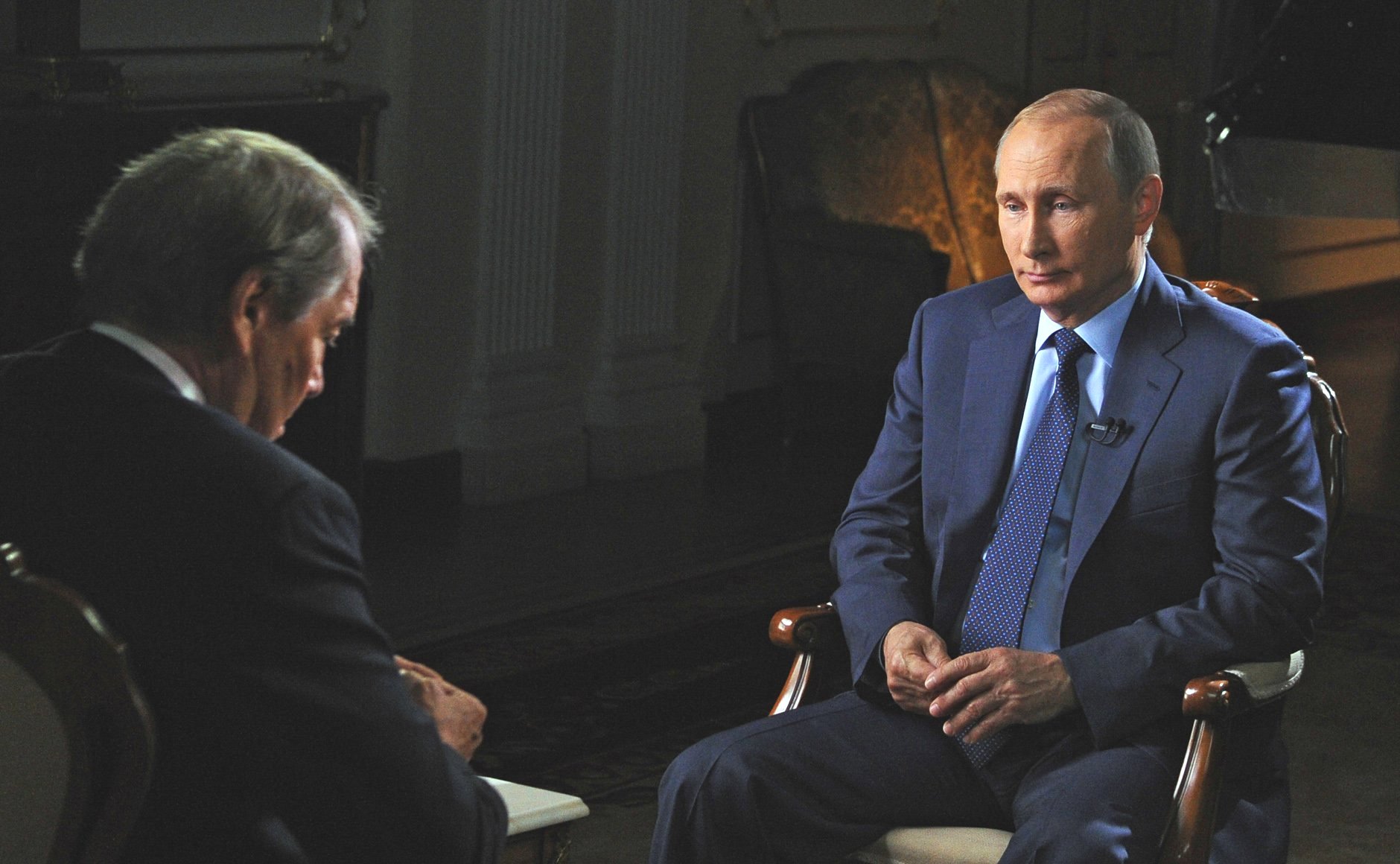Russia bets on Assad
Editor’s Note: Russia's decision to double down on the Assad regime and play a direct military role is fundamentally changing the civil war in Syria — and upending U.S. policy in the bargain. Although Obama administration officials are convinced Russia's intervention will fail in the long term, it is difficult to judge this and understand what Moscow might do next without understanding the reasons for intervention in the first place.

Editor’s Note: Russia's decision to double down on the Assad regime and play a direct military role is fundamentally changing the civil war in Syria — and upending U.S. policy in the bargain. Although Obama administration officials are convinced Russia's intervention will fail in the long term, it is difficult to judge this and understand what Moscow might do next without understanding the reasons for intervention in the first place. Carol Saivetz, a senior adviser in the Security Studies Program at MIT and regular Foreign Policy Essay contributor, explains Russia’s puzzling behavior, identifying the political and strategic factors shaping its intervention.
***
The Syrian civil war has been grinding on for more than four years and has stymied all the outsiders involved. U.S. bombing has not deterred the Islamic State, and the Pentagon has recently admitted that its plan to create “moderate opposition” military forces has failed. During this time Russia supported Syrian President Bashar al Assad by arming him and blocking UN efforts to resolve the Syrian crisis. Now, Russia has joined Turkey, Iran, Saudi Arabia, and the United States in directly taking part in the fighting: It hastily built an airfield near Latakia, deployed fighter jets and attack helicopters, and on September 30, 2015, began military operations. After a week of bombing sorties, Russia launched 26 cruise missiles from ships in the Caspian Sea ostensibly targeting the Islamic State. In announcing Russian military action, Russian President Vladimir Putin claimed that Russia was fighting the forces of Islamist extremism and invited the West to join Russia in the fight.
This overt support of Assad aims to accomplish several goals simultaneously. First, Moscow clearly hopes to break out of its isolation by switching the global focus from Ukraine to Syria. The operation is calculated to demonstrate that Russia is again a global power and that it is indispensable to solving the Syrian crisis. Second, the military intervention is a signal that the West cannot stage another revolution from the outside, as Russia claims happened in Libya and elsewhere. Put bluntly, Russia will protect Assad from being ousted by the United States. Both of these goals will play well at home, yet they are at odds with each other: One requires engagement with the West, and the second demands a confrontational relationship. Third, backing Assad — in conjunction with Iran — allows Moscow to demonstrate that it is a useful and important friend to Tehran.
Russia has scored some short-term successes: Opinion pages bemoan U.S. President Barack Obama’s indecision and claim that Russia has again taken advantage of U.S. weakness. On the ground, observers note that Russia has indeed created for itself a major role in any Syrian outcome.
But this confuses both why Putin thought he could be successful and the reality of the current situation. Russia certainly now has a role in Syria, but it has not reemerged from its isolation. If anything, Putin’s actions have further alienated him from President Obama and the West. In his United Nations General Assembly speech, Putin disdainfully accused the United States of fomenting instability in the Middle East. Two days later, and with only one hour’s notice, Russia began launching strikes against groups not affiliated with the Islamic State — including some supported by the United States. All pretense of making common cause with the United States was dropped when Putin, in a TV interview, declared: “Our task is to stabilize the legitimate government and establish conditions that will make it possible to look for political compromise” (italics added). This seems an odd way of reengaging with the West.
Russia certainly now has a role in Syria, but it has not reemerged from its isolation. If anything, Putin’s actions have further alienated him from President Obama and the West.
The military action in Syria has provided Moscow with an excellent theater in which to test new weaponry. According to analysts, Russia has exported Su-30 fighter planes to over a dozen countries, but has not used them in battle; and the Su-34s are proving their worth in combat. Most strikingly, Russia has now used long range cruise missiles for the first time. In a televised meeting with Defense Minister Sergei Shoigu, Putin praised the precision of the missiles’ trajectory and said they were “evidence of our defense industry’s good preparation and the service personnel’s good professional skills.” Days later, Putin went even further in underscoring the demonstration effect of the launches, stating in a television interview:
[I]t is one thing for the experts to be aware that Russia supposedly has these weapons, and another thing for them to see for the first time that they really do exist…. They have seen too now that Russia is ready to use them if this is in the interests of our country and people.
Longer term — the show of military hardware notwithstanding — Russia has made a risky wager that could well endanger the very goals it hopes to achieve.
The gravest danger to Russia lies in the nature of the conflict itself. Though it did not start out that way, it has become a sectarian conflict between Turkish, Saudi, and U.S.-backed Sunni forces on one side and Shi’a groups supported by Iran, Hezbollah and now Moscow. Moscow’s decision to join the Shi’a axis stands in contrast to Russia’s substantial, predominantly Sunni Muslim population. Even though Russia’s Muslims have thus been far relatively quiescent, Moscow acknowledges that more than 2,000 Russian citizens have joined the Islamic State. More are likely to be recruited: In May, the Islamic State produced its first online Russian-language magazine, and in July, Islamists in southern Russia pledged allegiance to the Islamic State.
The Syrian civil war is far more complicated politically and militarily than the war in Eastern Ukraine. Russian analysts warn that Syria is neither a “media war” nor a “hybrid war in which polite little green men can cope.” Putin has promised the Russian public a quick and painless victory. But can he deliver? As the October 13 shelling of the Russian embassy compound in Damascus demonstrates, Russian property and men are not immune to attack. The delivery of TOW anti-tank missiles to the forces Russia opposes by the United States and Saudi Arabia has accelerated in recent days, and the Saudis have not ruled out providing surface-to-air missiles to groups they are supporting. Reportedly, Arab ambassadors warned Russian Foreign Minister Sergei Lavrov that Russia’s involvement would trigger attacks by jihadis looking to liberate Syria from the Russians.
Putin has promised the Russian public a quick and painless victory. But can he deliver?
Nor is the home front secure. The leader of Jabhat al-Nusra, al-Qaida’s branch in Syria, has called for Muslims in the North Caucasus to “distract” Moscow from the conflict in Syria by attacking inside Russia. And reports and pictures have surfaced on the Internet of conscript soldiers refusing to fight in Syria.
The Russian intervention is also roiling Moscow’s relations with Turkey and Saudi Arabia. After Russian planes violated Turkish airspace three times, NATO offered to send forces to protect Turkey. Turkish President Recep Tayyip Erdogan warned Moscow that if Turkey was threatened by Russian activity in Syria, Ankara would sever economic relations with Moscow. With regard to Saudi Arabia, any expectations of improved relations were dashed during the recent visit of Saudi Defense Minister Mohammed bin Salman and Foreign Minister Adel al-Jubeiri to Moscow, during which both reiterated that Bashar Assad must leave power and that Riyadh would continue to arm so-called moderates.
Moreover, the longer the war continues, the greater the danger of direct U.S.-Russian confrontation. Russian military operations are a reality with which the Western forces have to contend. There have already been a few close calls between U.S. and Russian aircraft over Syria. Yet despite meetings to establish rules of engagement, and despite Putin’s lament over the lack of cooperation, there is no extended collaboration or coordination.
If anything, tensions between NATO and Russia are only going to get worse. It is important to remember that this dramatic escalation of the Syrian conflict comes on the heels of the confrontation between Russia and the West over Ukraine. The war in the Donbas and the annexation of Crimea may no longer be on the front pages of newspapers, but NATO continues to focus on the stalemate there. Sanctions remain in place and NATO recently announced stepped up deployments and military exercises in Eastern Europe and the Baltic States. Announcing these latest moves, NATO Secretary General Jens Stoltenberg stated in no uncertain terms that “All of this sends a message to NATO citizens: NATO will defend you, NATO is on the ground, NATO is ready.”
It is difficult to predict what the endgame will be in Syria. Although Russia has now made sure that Assad will either continue in power or be part of a drawn out transition process, it is difficult to see why groups now being bombed by Russian planes would be interested in negotiating with the Syrian government. Absent either a transition or a victory, Assad may well retreat to the Alawite heartland along the Mediterranean, protected by Russian forces. Either way, by becoming directly involved in the conflict in order to protect Assad, Putin has inserted Russia into a highly volatile situation. If Russian forces remain for only a few months and if Putin does not commit ground troops, then Vladimir Putin can claim success. If nothing else, Russia has demonstrated its ability to shake up the chess board and to project power outside of the former Soviet space. Yet the longer the deployments continue, the greater the risks. Moscow may yet find itself involved in a protracted civil war like the one in Afghanistan in the 1980s that holds serious ramifications for Russia at home and abroad.





